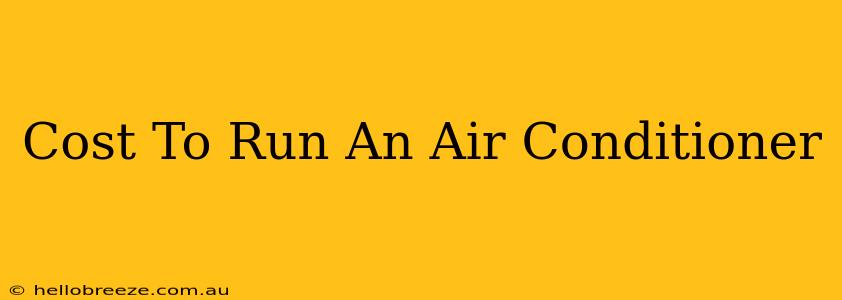Summer's heat can be unbearable, making your air conditioner an essential appliance. But how much does it really cost to keep cool? This comprehensive guide breaks down the factors influencing your AC's energy consumption and provides tips to minimize those costs.
Factors Affecting Your Air Conditioning Costs
Several factors contribute to the overall cost of running your air conditioner. Understanding these will help you better manage your energy expenses.
1. Your Air Conditioner's SEER Rating:
The Seasonal Energy Efficiency Ratio (SEER) is a crucial metric. A higher SEER rating indicates greater energy efficiency. Higher SEER = Lower operating costs. Newer AC units typically boast higher SEER ratings than older models. Consider upgrading if your current unit has a low SEER rating.
2. Size and Type of Your AC Unit:
The size of your AC unit should match the square footage of your space. An undersized unit struggles to cool efficiently, consuming more energy. Conversely, an oversized unit cycles on and off frequently, also leading to higher energy bills. The type of AC unit (window, central, portable) also impacts efficiency. Central AC systems are generally more efficient than window units.
3. Your Home's Insulation and Sealing:
Poor insulation and air leaks allow cooled air to escape, forcing your AC to work harder. Proper insulation and sealing are crucial for minimizing energy loss and reducing your cooling costs.
4. Thermostat Settings and Usage:
Even small adjustments to your thermostat can significantly impact energy consumption. Raising the thermostat by a few degrees when you're away or asleep can result in considerable savings. Smart thermostats offer programmable options for automated temperature adjustments, further optimizing energy usage.
5. Electricity Prices:
Your electricity provider's rates directly influence your overall AC costs. High electricity prices mean higher cooling expenses. Consider exploring energy-saving plans offered by your provider.
6. Climate and Outdoor Temperature:
The hotter the outside temperature, the harder your AC has to work. Living in a region with consistently high temperatures will naturally lead to higher energy costs during the summer months.
Calculating Your Air Conditioning Costs
Estimating the cost can be complex, but here's a simplified approach:
- Find your AC's BTU (British Thermal Unit) rating. This is usually found on the unit itself or in the owner's manual.
- Determine your electricity cost per kilowatt-hour (kWh). Check your electricity bill for this information.
- Use an online AC cost calculator. Many websites provide free calculators that estimate your running costs based on the BTU rating, hours of use, and electricity cost.
Important Note: These calculations are estimates. Actual costs can vary depending on the factors listed above.
Tips for Reducing Your Air Conditioning Costs
- Regular Maintenance: Schedule annual maintenance checks to ensure your unit is running efficiently.
- Clean or Replace Air Filters: Clogged filters restrict airflow, reducing efficiency and increasing energy consumption.
- Use Fans: Ceiling fans and portable fans help circulate air, reducing the strain on your AC.
- Plant Trees: Strategically placed trees can provide shade, reducing the amount of heat absorbed by your home.
- Close Curtains and Blinds: This helps prevent solar heat gain during the day.
By understanding the factors influencing your air conditioning costs and implementing energy-saving strategies, you can keep your home cool without breaking the bank. Remember to regularly evaluate your usage and explore options to optimize your energy consumption.

